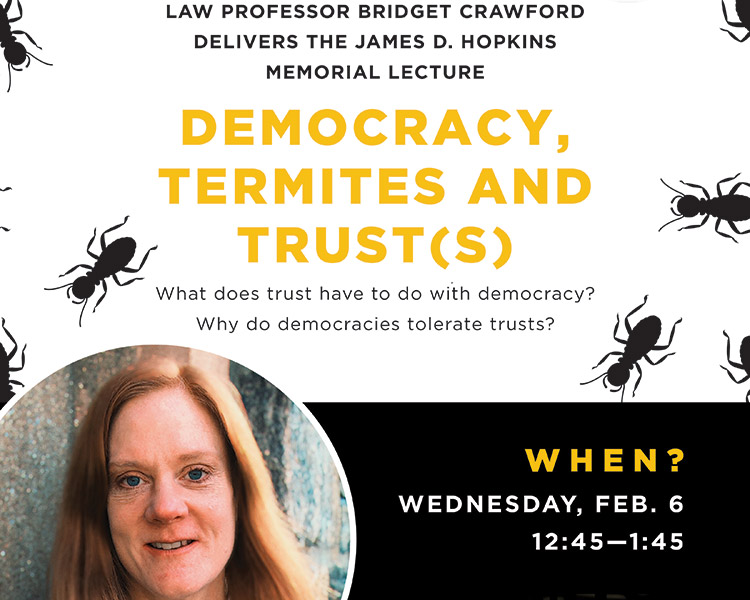James D. Hopkins Professor of Law Memorial Lecture

James D. Hopkins Professor of Law Memorial Lecture
Professor Bridget Crawford has been named as the James D. Hopkins Professor of Law for the 2017-2019 academic years. The Hopkins professorship is an endowed chair established to honor Judge James D. Hopkins, who served as interim dean of Pace Law School from 1982-83. The Chair is awarded every two years to a faculty member who has made extraordinary contributions to the law school primarily in the areas of scholarship and teaching. Please join the James D. Hopkins Professor Law, Professor Bridget Crawford, as she delivers her Hopkins Memorial Lecture, Democracy, Termites and Trust(s).
The word “trust” has multiple meanings. In everyday speech, it refers to a feeling of confidence associated with integrity: trusting that a friend will keep a secret or that a defendant will receive a fair trial. In a financial context, some law students, lawyers and lucky individuals understand that a trust is also a near-magical device, splitting legal and equitable title between a trustee and a beneficiary. A trustee holds formal legal title to property for the benefit of a beneficiary, simply because the grantor declared it to be so.
Turning a spotlight on trust – in both senses of the word – helps us see the precarious, vulnerable nature of democracy in the United States today. Just as termites can enter homes through foundational cracks or wood brought from the outside, public trust in the government erodes when a nation’s elected leaders are dishonest or stifle dissent. Individuals or groups, both internal and abroad, also can undermine trust in political and legal systems though the targeted use of social media to spread false information. And just as termites can slowly and steadily damage a home over a period of years before the harm suddenly becomes visible, the beneficial form of ownership known as a trust has gradually – and now suddenly – morphed nearly beyond recognition over the last twenty years. Traditional trust limitations — including how long trusts can last, in what circumstances they can be modified, and what types of property they can hold — have been eaten away. In some states, irrevocable trusts can now last forever, be decanted to another trust with entirely different terms, or even hold legal “title” to human embryos.
These changes to centuries of trust law reveal changing attitudes about wealth, property ownership, and personal autonomy that are distress signals in an ailing democracy. If society truly values equal opportunities for all people, then trust and trusts need attention.
